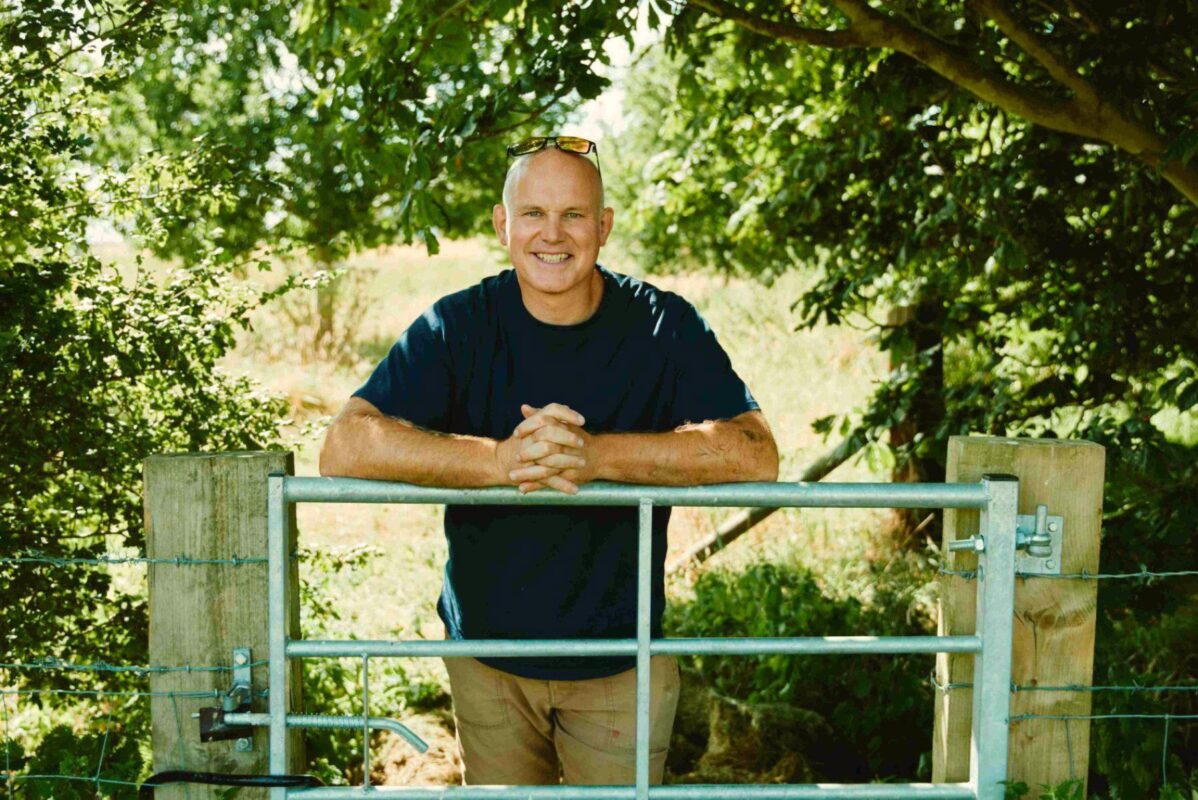From storytelling and saunas to yoga, art and even outdoor theatre, a new generation of UK farmers are encouraging people to connect with nature on their patches
A line of people are vanishing, one by one, into a hedgerow on a hillside near Aylesbury, England. Hidden inside the thick hedge, under the spreading branches of a crab apple tree, is an unexpectedly spacious hollow. But perhaps most unexpected of all is the showerhead fixed to the tree’s trunk.
Tony Langford created this ‘hedge shower’ so campers on his farm can enjoy hot showers while being quite literally immersed in nature. He shoots a jet of water to demonstrate. “Though I’ve never had this many people in here at once,” he says.
Pitchcott Farm has been in Langford’s family for three generations, but he has a decidedly untraditional approach to public access on to his land. Langford, who spent his career in mindfulness before inheriting the farm five years ago, is opening his gates to help reconnect people and nature. Today he’s showing a group of 15 local farmers how this is taking shape there, from community festivals to ‘nature bathing’ walks.
He guides these walks himself, across pastureland with far-reaching views over Aylesbury Vale. “You’re trying to quiet the chatter of the mind and open the senses to what’s in the natural environment,” he explains. “What we hear, what we feel, what we smell. And as a result, maximising the benefits that nature gives us.”
Agricultural land makes up 70% of the UK, according to Defra. Many farmers are finding their livelihoods under great pressure, especially given one of the wettest growing seasons ever recorded this summer. Meanwhile, the benefits of spending time in green spaces are by now well-documented. So, people like Langford see a mutually beneficially opportunity.
He is one of a new generation of farmers who, instead of trying to keep people off their land, are actively encouraging them to come on to it, through activities from solstice celebrations to gyms. Eddie Rixon, a third-generation farmer at Lopemede Farm near Thame, is another. He took over the beef farm 10 years ago, but in 2019 was forced to reassess its future after a tuberculosis breakdown in the herd.
Rixon describes it as a “horrendous” time. “My mum and dad built the herd up, for it all to end overnight,” he says. A former supermarket buyer, Rixon says he was not able to compete on price post-Brexit. Instead, he saw an opportunity to invest in the farm’s ‘natural capital’ as a way to boost its finances.
He developed a 30-year-strategy to restore pastures and wetlands as a way to build up the farm’s agritourism offering. But when a teacher at his daughters’ forest school approached him about setting up an art centre last year, he realised he could make something happen sooner. He set up a yurt in an unproductive field that had been used for grazing sheep, launching an art forest school.
“We were making hundreds of pounds a year. Now we have the art forest school here we’re making about £6,000 a year,” Rixon says. He has sown the rest of the one-hectare field with wildflowers. “For me, it was like a proof of concept. Not only am I increasing the biodiversity here, I’m increasing the social and community aspect of educating children – and economically it’s working.”
Not only am I increasing the biodiversity here, I’m increasing the social and community aspect – and economically it’s working
Today, activities there range from saunas to outdoor theatre productions. Jess and Greg Symondson run Firelight Yoga from a field behind the barns, where they hold wellness sessions, live music and feast nights. “People are talking to others, they’re off their phones, they’re taking off their shoes,” says Jess. “Even on the two-minute walk to the tipi, you can see people begin to decompress.”
Meanwhile, Rixon is delighted that the farm is at the heart of the community again, something he says was severed during mechanisation. He grew up reading comics that showed farmers shouting: “Get off my land!” “We’ve kind of flipped that, to ‘get on our land’,” he laughs.
But this isn’t a free-for-all. Rixon has a code of conduct for visitors, and some areas remain out of bounds for safety reasons. He’s also using technology to open up the farm remotely, including installing cameras in owl boxes, which allow local schoolchildren to watch barn owls chicks without disturbing their nest.
It’s all very well then, for those enjoying a moonlit sauna or idyllic yoga session, but what about the pressing need for an affordable – and secure – food supply? After all, nature-based activities reduce the amount of land for food production. Lopemede is still very much a working farm, points out Rixon. Wagyu cows – successors to Eddie’s parents’ herd – are grazing around saplings that were planted to provide shade for animals and campers alike as summers become hotter.
For Rixon, the two elements can be complementary. “Because I’m a multigenerational farmer, I need to invest in the health and biodiversity of the farm for the next generation,” he explains. “That intrinsically fits with everything else. If profit was the only driver, you wouldn’t have a very sustainable business,” he says.
He’s keen to encourage other farmers to replicate his model, and with the help of George Simons and Innovate UK funding, has developed a Roots and Rhythms project with templates and ideas.
I need to invest in the health and biodiversity of the farm for the next generation
Putting a monetary figure on the social value generated by these sorts of activities is complex. But a report by the Countryside and Community Research Institute found that for every £1 invested in Pitchcott, including in a new cafe and events space, almost £3 will be generated in social value, including improvements to health. This is projected to deliver £2.8m in benefits over five years.
Some things, however, can’t be quantified. In a meadow decorated with brightly coloured flags, campers are arriving for Pitchshift, Langford’s annual festival of communal cooking, dancing and storytelling. This is Judith Campbell’s fifth time here. Her tent won’t go up properly and it is drizzling, but she is beaming nonetheless.
“I love being with my friends. I love dancing. I love nature. It takes me out of myself and makes me feel part of something bigger than myself,” she says. “I feel my endorphin levels changing. I feel more loving towards people,” she says.
Her enthusiasm is testament to Langford’s fresh way of thinking. “Often, there’s a farm gate which is closed with a sign saying: ‘beware of the dog’ or whatever,” he says. “I’m thinking – how can we open that farm gate?”
Photography: Will Elsom
Read more: Three more UK farms diversifying with nature connection in mind
Be part of the solution
Positive News is helping more people than ever to get a balanced and uplifting view of the world. While doom and gloom dominates other news outlets, our solutions journalism exists to support your wellbeing and empower you to make a difference towards a better future.
But our reporting has a cost and, as an independent, not-for-profit media organisation, we rely on the financial backing of our readers. If you value what we do and can afford to, please get behind our team with a regular or one-off contribution.
Give once from just £1, or join 1,500+ others who contribute an average of £3 or more per month. You’ll be directly funding the production and sharing of our stories – helping our solutions journalism to benefit many more people.
Join our community today, and together, we’ll change the news for good.


